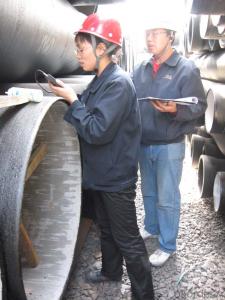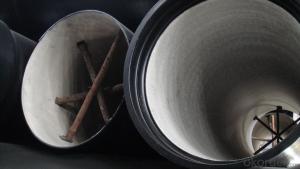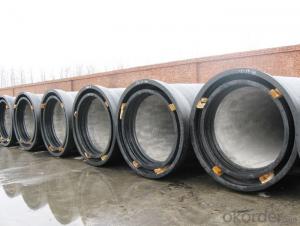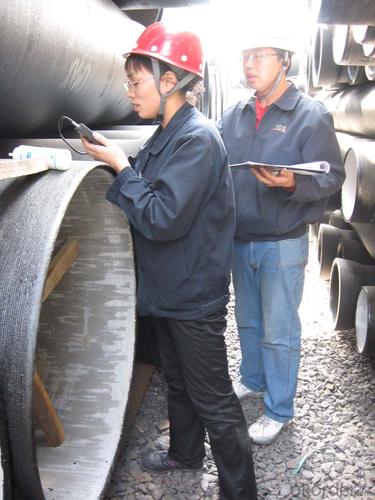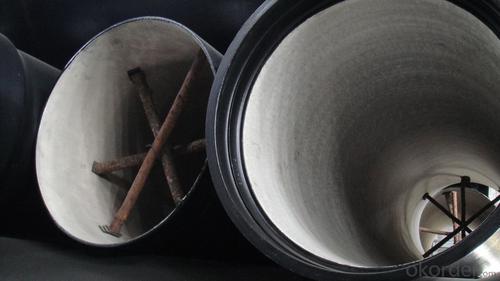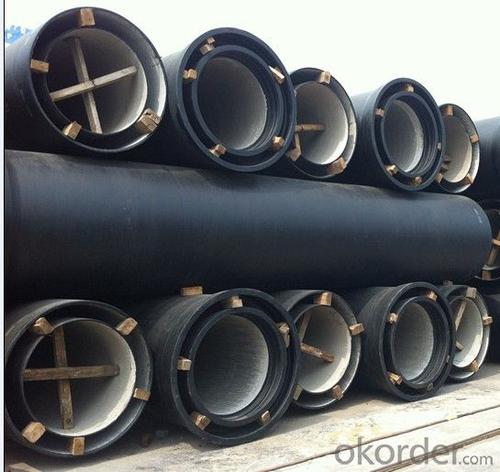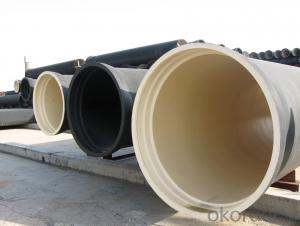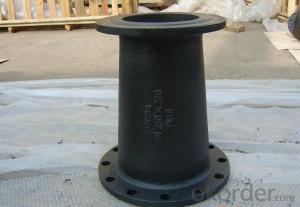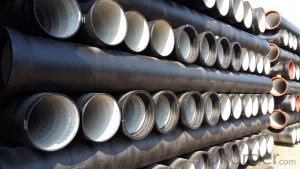Ductile Iron Pipe On Sale Made In China DN350
- Loading Port:
- Tianjin
- Payment Terms:
- TT OR LC
- Min Order Qty:
- 1000 m
- Supply Capability:
- 10000 m/month
OKorder Service Pledge
OKorder Financial Service
You Might Also Like
1.Packaging & Delivery
Packaging Detail: | DN80-300 bundled with steel belt ( the bundle size see the product detail part) DN400-1200 are in bulk |
Delivery Detail: | at least 5days for MOQ |
2.Specifications
Ductile iron pipe comply with ISO2531/EN545
1)We are factory
2)Best quality
3)Competive price
4)On time delivery
3.Features:
Facilitating high resistance to loadings, pressure and vacuum with high tensile strength,
Enabling high resistance to corrosion,
Not requiring cathodic protection,
Less operating cost since cast pipes have larger nominal diameter than polyethylene pipes.
Being the best pipe in case of an earthquake, with its ability of resilience and resistance to impacts without deformation,
Long product life, exceeding 50 years,
Preserving the quality of water with healthy interior coating.
4.Applied Standards:
General Design | ISO 2531 |
Internal Lining | ISO 4179 |
External Coating | ISO 8179 |
Polyethylene Coating (Optional) | ISO 8180 |
5.Joint Types:
Push-on Type | TYT Type |
Standard Type |
6. Diameters:
Pipes | Ø80 – Ø1200 mm (L = 6m, and 5.7m) |
Fittings | Ø80 - Ø2200 mm |
7. Wall Thickness:
Pipes | C and K classes |
Fittings | Class K10 - K12 |
8.Test Pressures:
Pipes | for Ø80 - Ø300 mm | 50 bar / 40 bar |
for Ø350 - Ø600 mm | 40 bar / 30 bar | |
for Ø700 - Ø1000 mm | 32 bar / 25 bar | |
for Ø1100 - Ø2600 mm | 25 bar |
Fittings | for Ø40 - Ø300 mm | 25 bar (*) |
for Ø350 - Ø600 mm | 16 bar | |
for Ø700 - Ø2600 mm | 10 bar | |
(*16 bar for fittings with PN10 flanges) | ||
9.Materials:
Pipe | Ductile iron casting, minimum 420 MPa tensile strength |
Internal Lining | Concrete Lining, ISO 4179 |
Socket Internal 10.Lining | 200 micron epoxy coating |
External Coating | 70 micron bitumen coating on 130 gr/m2 zinc coating, ISO 8179 |
Fittings | Ductile iron casting, minimum 420 MPa tensile strength |
Internal Lining | Concrete Lining, ISO 4179 |
External Coating | 70 micron bitumen coating on 130 gr/m2 zinc coating, ISO 8179 |
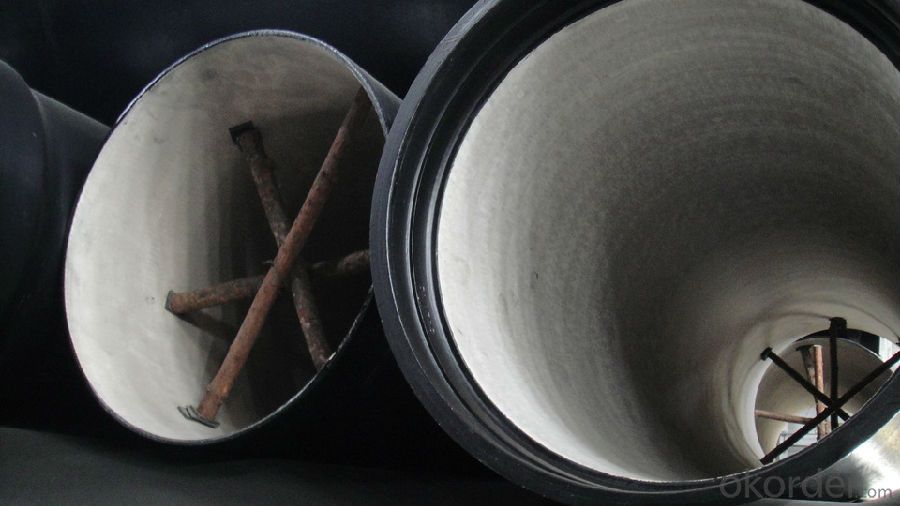
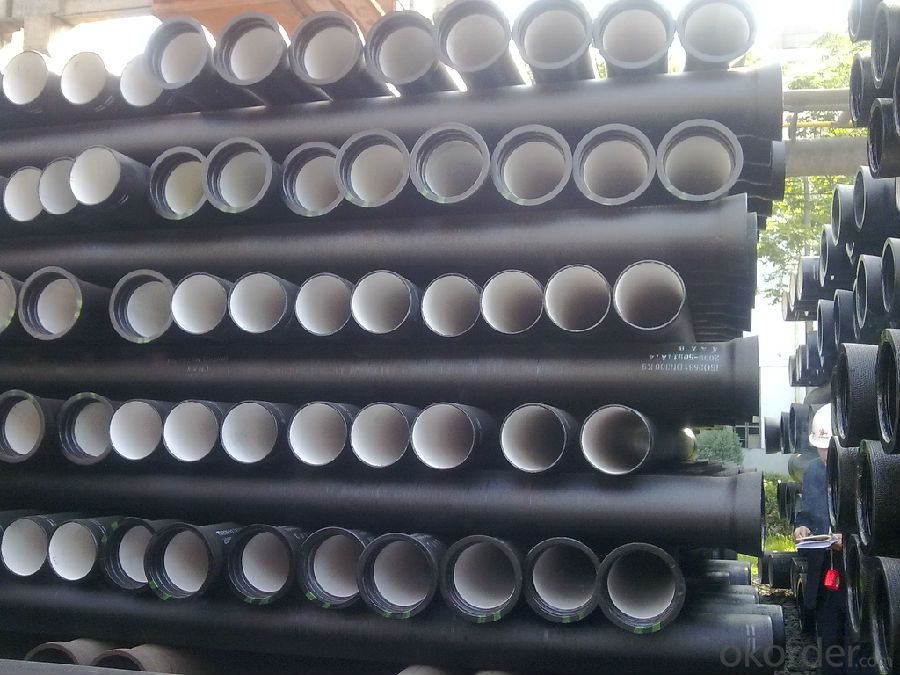
- Q: Can ductile iron pipes be used for bridge piers?
- Yes, ductile iron pipes can be used for bridge piers. Ductile iron pipes are known for their high strength and durability, making them suitable for various applications, including bridge construction. They have excellent resistance to corrosion and can withstand heavy loads, making them a reliable choice for supporting bridge piers. Additionally, ductile iron pipes offer ease of installation and maintenance, which can be advantageous in bridge construction projects. However, it is important to consider the specific requirements and design specifications of the bridge before selecting ductile iron pipes as the material for bridge piers. Proper engineering evaluation and consideration of factors such as load capacity, soil conditions, and environmental factors are essential to ensure the suitability and safety of using ductile iron pipes for bridge piers.
- Q: How are ductile iron pipes restrained against axial thrust forces?
- Ductile iron pipes are typically restrained against axial thrust forces through the use of various mechanical joint systems. These joints, such as the push-on joint or the restrained joint, provide a secure connection between the pipes, preventing movement and ensuring structural integrity. Additionally, methods like concrete thrust blocks or anchor blocks are often used to further restrain the pipes and counteract any axial thrust forces that may be exerted on them.
- Q: Can ductile iron pipes be used for railway bridges?
- Yes, ductile iron pipes can be used for railway bridges. Ductile iron is a type of strong and durable cast iron that has excellent tensile strength and flexibility. These properties make it suitable for various applications, including railway bridges. Ductile iron pipes can be used to construct railway bridge components such as supports, beams, and columns. They provide structural stability and can withstand heavy loads and vibrations associated with railway traffic. Additionally, ductile iron pipes are resistant to corrosion, which is crucial for railway bridges exposed to outdoor conditions. Therefore, ductile iron pipes are a viable option for railway bridge construction.
- Q: How do ductile iron pipes handle extreme temperatures?
- Ductile iron pipes, also known as cast iron pipes, are known for their ability to handle extreme temperatures effectively. The material composition of ductile iron allows it to withstand both high and low temperatures without experiencing any significant damage or degradation. At high temperatures, ductile iron pipes exhibit excellent thermal resistance, making them suitable for applications where hot liquids or gases need to be transported. The high melting point of ductile iron, which ranges between 2060°C and 2200°C, ensures that the pipes can handle extreme heat without melting or deforming. This makes them ideal for use in industries such as oil and gas, steam distribution, and high-temperature water supply systems. Similarly, ductile iron pipes also perform well in low-temperature environments. They have a low coefficient of thermal expansion, meaning they can withstand the contraction and expansion that occurs during temperature fluctuations without cracking or fracturing. This makes them suitable for use in cold climates or applications that involve the transportation of chilled liquids or gases. Moreover, ductile iron pipes have excellent thermal conductivity, which allows them to quickly dissipate heat. This property is particularly important in high-temperature applications where efficient heat transfer is crucial to prevent damage to the pipes or the substances being transported. In summary, ductile iron pipes can handle extreme temperatures effectively due to their high melting point, low coefficient of thermal expansion, and excellent thermal conductivity. These properties make them a reliable choice for various applications that involve extreme temperature conditions.
- Q: Can ductile iron pipe be used in areas with high groundwater levels?
- Areas with high groundwater levels can indeed utilize ductile iron pipe. This type of pipe is renowned for its robustness and sturdiness, which renders it appropriate for a wide range of purposes, including areas with high groundwater levels. Its resistance to corrosion ensures that it remains highly impervious to the damaging impact of groundwater, thereby guaranteeing enduring efficiency and dependability. Furthermore, the flexible joints of ductile iron pipe enable it to endure ground shifts and settlements caused by fluctuating groundwater levels. As a result, it represents a suitable choice for regions with high groundwater levels, offering a dependable solution for water distribution systems and other subterranean applications.
- Q: Can ductile iron pipe be used for desalination plants?
- Certainly, desalination plants can utilize ductile iron pipe. Ductile iron, a robust and enduring material, has found extensive application across various industries, notably in water and wastewater treatment facilities. It boasts exceptional resistance against corrosion, remarkable tensile strength, and the ability to withstand external loads and pressures. Consequently, it proves ideal for conveying water and other fluids within desalination plants, where the presence of high salt concentration and other corrosive elements prevails. Furthermore, ductile iron pipes are renowned for their prolonged service life and minimal maintenance demands, rendering them advantageous to desalination plants that operate continuously and necessitate a dependable and efficient piping system.
- Q: Can ductile iron pipe be used for industrial process piping?
- Yes, ductile iron pipe can be used for industrial process piping. Ductile iron pipe is known for its strength, durability, and corrosion resistance, making it suitable for various industrial applications including process piping. It can handle high-pressure and high-temperature environments, making it a reliable choice for transporting fluids and gases in industrial settings.
- Q: Are ductile iron pipes suitable for underground river crossings?
- Indeed, underground river crossings can be facilitated by the use of ductile iron pipes. Ductile iron, being a robust and long-lasting material, can endure the external stresses and burdens encountered in such crossings. With its superb tensile strength, impact resistance, and durability, ductile iron is exceptionally well-suited for underground applications where the pipes may face elevated water pressure, ground displacement, or various environmental influences. Furthermore, ductile iron pipes possess an extended lifespan and are impervious to corrosion, a vital attribute when dealing with water crossings. Their capacity to withstand these circumstances renders them a dependable choice for underground river crossings.
- Q: What is the maximum temperature that ductile iron pipes can handle?
- Ductile iron pipes can handle temperatures up to a maximum of around 1000 degrees Fahrenheit (538 degrees Celsius).
- Q: Classification of cast iron pipes
- Continuous cast iron straight pipe:Continuous cast iron pipe, namely continuous casting gray cast iron pipe, suitable for water and gas pressure fluid delivery.
Send your message to us
Ductile Iron Pipe On Sale Made In China DN350
- Loading Port:
- Tianjin
- Payment Terms:
- TT OR LC
- Min Order Qty:
- 1000 m
- Supply Capability:
- 10000 m/month
OKorder Service Pledge
OKorder Financial Service
Similar products
Hot products
Hot Searches
Related keywords
